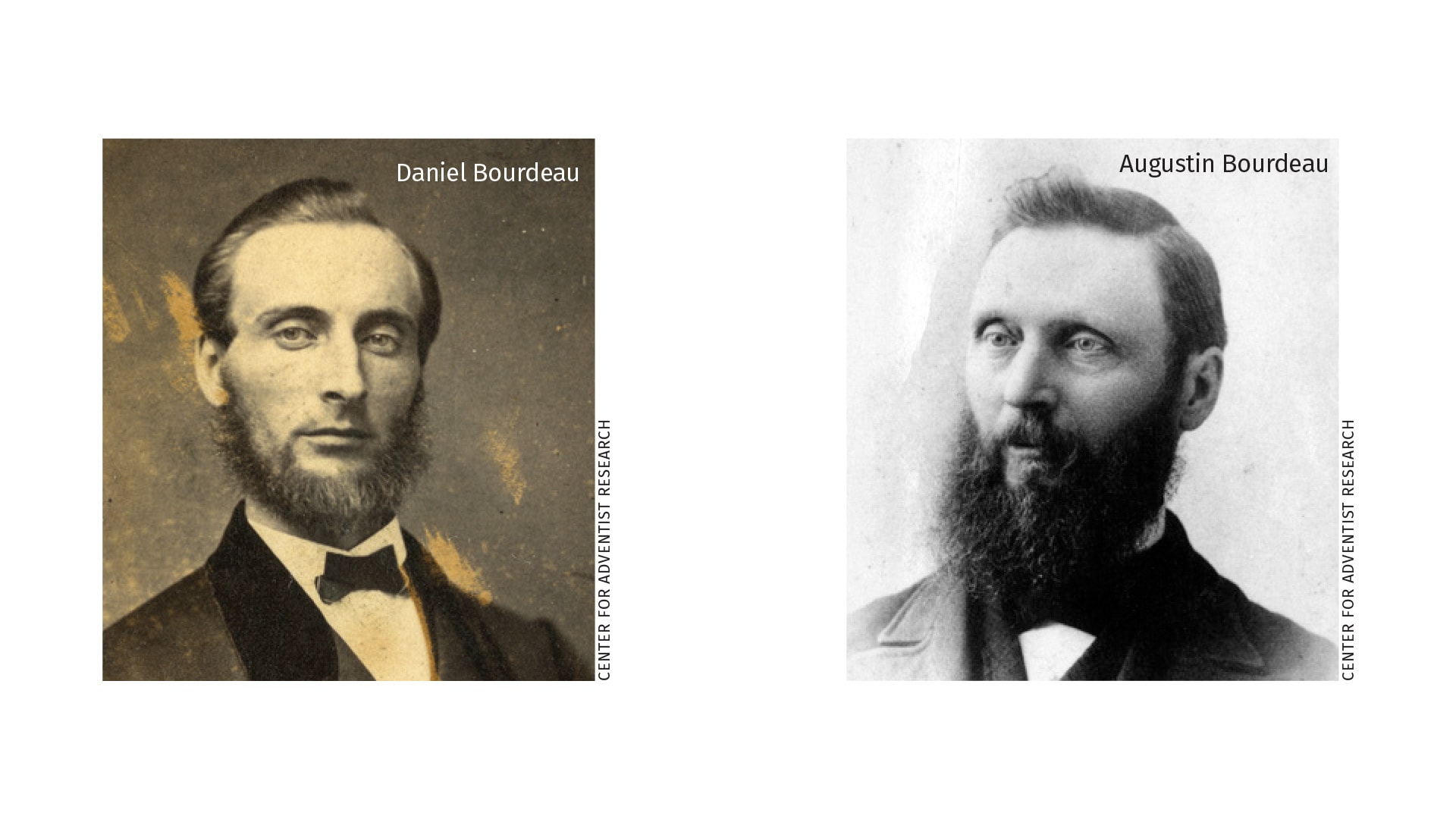
Born only a year apart, in the village of St. Armand, Lower Canada (now Quebec), brothers Augustin (1834-1916) and Daniel (1835-1905) Bourdeau were a rare French-speaking evangelistic duo. Their parents converted to the Baptist Church before they were 6 and shortly thereafter moved to northern Vermont, where their little hamlet came to be known as Bordoville. Augustin C. Bourdeau attended the French Baptist school at the Grande Ligne Mission in Lower Canada from 1851 to 1854, where he prepared to be an evangelist.1
Following his studies, Augustin began working as a Baptist evangelist in towns near his home in Vermont, until a visit from his brother-in-law, William L. Saxby, in 1855 convinced him to become a Sabbatarian Adventist. The following spring he visited his brother, Daniel T. Bourdeau, who taught at the Grande Ligne Mission, and persuaded him to observe the Sabbath. Soon after, Augustin and Daniel began preaching their new faith in nearby towns.2
Evangelists in the United States and Canada
The brothers were instrumental in raising many churches in northern Vermont and Quebec in the 1860s. At the request of the General Conference, Augustin and Daniel Bourdeau spent some time assisting George I. Butler in Iowa in 1866.
After returning to Vermont, Augustin continued his work as an evangelist and church planter. For his part, Daniel remained in Iowa longer, and in 1868 he joined John Loughborough in opening the Adventist work in California.3
In 1875 Ellen White, recognizing the gifts that Daniel and his wife, Marion, showed in their work among French people, commented, “I wish there were more Frenchmen who could labor where the Americans can do nothing.”4 That same year, listening to Ellen White’s counsel on working among the French, Augustin began working with his son-in-law, Rodney S. Owen, in the Eastern Townships of Quebec, and in 1880 became president of the Quebec Conference, the first conference organized in Canada.5
Daniel Bourdeau also devoted many years working in the Midwestern states, particularly among the French-speaking communities of Illinois and Wisconsin, for which he felt a special burden. He was successful in raising a church among the French-Canadian community of Ste-Anne-de-Kankakee, Illinois.6
Europe
With so few pastors fluent in French, it was natural that both brothers would in time become missionaries in Europe. Daniel was the first of the two to travel to Europe to assist the work of John N. Andrews. During his first stint there (1875-1876), Daniel wrote articles for the new journal Les Signes des Temps, translated articles, books, and pamphlets, and conducted evangelism in France and Switzerland.
But this brief period in Switzerland was not without some trouble. Ellen White regarded Daniel’s year in Europe as a disaster for the Adventist work. Bourdeau’s impulsive temperament, his constant interest in himself and his accomplishments, and his independent spirit and mindset brought intolerable burdens on John Andrews. She felt strongly that Bourdeau should not go back to Europe unless other church administrators invited him to do so.7 In fact, Andrews wrote to Ellen White, asking her to intervene when he heard that Bourdeau was planning to go back to Europe, and she was successful in delaying his return for some time.8
Daniel Bourdeau returned to Europe in 1883, a few weeks before John Andrews died. Ellen White continued to send letters encouraging him to be more patient and self-controlled. She also counseled him to be gentle in preaching against Catholics and other denominations, and to not unnecessarily arouse antagonism from other ministers.9
During this second period of service in Europe (1883-1887), Daniel engaged in evangelistic labor, at times in collaboration with his brother, Augustin, who joined him in 1884. Together they established new congregations in Switzerland, France, Italy, and Romania.
Final Years
Both Augustin and Daniel Bourdeau returned to the United States in 1888. Depleted of energy and disabled by illness, Augustin worked for the church in various areas for short periods of time. Despite his limitations, he raised new churches in Vermont and Quebec, as well as in Michigan, Pennsylvania, Dakota territory, Manitoba, California, and Mississippi.10 His last years were lived in Kalamazoo, Michigan. He died on July 7, 1916. Daniel also worked in numerous places assisting his brother, and died in Grand Rapids, Michigan, in 1905.11 Both brothers were buried in Oak Hill Cemetery in Battle Creek.
Augustin and Daniel Bourdeau were French-speaking pioneer evangelists and missionaries whose efforts, by God’s grace, at reaching people with the three angels’ messages are still seen in many parts of North America and Europe.
1 S. B. Horton, “Another Pioneer Laid to Rest,” Review and Herald, Aug. 17, 1916, pp. 16, 17; General Conference Archives, Secretariat Missionary Files, RG 21, Record 114881, Augustin C. Bourdeau Biographical Information Blank, Sept. 5, 1905.
2 Denis Fortin, Adventism in Quebec: The Dynamics of Rural Church Growth, 1831-1910 (Berrien Springs, Mich.: Andrews University Press, 2004), pp. 64-68.
3 General Conference Archives, Secretariat Missionary Files, RG 21, Record 114881, Daniel Touissant Bourdeau Biographical Information Blank, Sept. 5, 1905.
4 Ellen G. White letter 49, 1875.
5 Denis Fortin, “The Quebec Seventh-day Adventist Church Association,” Adventist Heritage 14, no. 3 (Winter 1992): 14-18.
6 D. T. Bourdeau, “Progress Among the French in Illinois,” Review and Herald, July 22, 1875, p. 30.
7 Ellen G. White letter 21, 1879; Ellen G. White letter 4, 1881.
8 Ellen G. White letter 5, 1881; see also Gilbert Valentine, J. N. Andrews: Mission Pioneer, Evangelist, and Thought Leader (Nampa, Idaho: Pacific Press Pub. Assn., 2019), pp. 568-575, 680.
9 Ellen G. White letter 39, 1887.
10 Augustin C. Bourdeau Biographical Information; Horton, p. 16.
11 G. W. Morse, “The Passing of the Pioneers,” Review and Herald, July 13, 1905, pp. 17, 18.